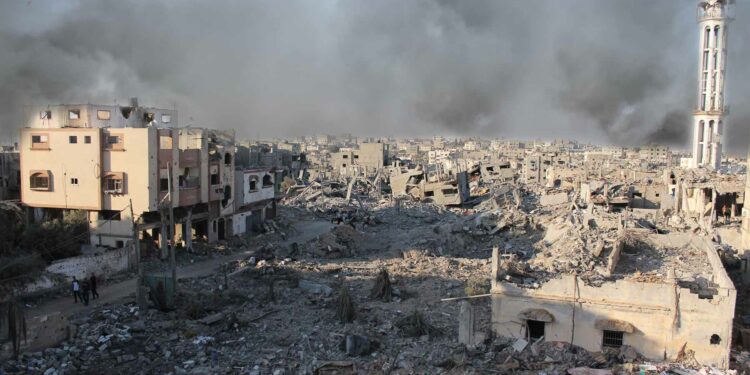On June 30, the United Nations convened the third meeting of special envoys on Afghanistan in Doha, Qatar. This marks the third attempt by the UN to navigate discussions on Afghanistan’s situation, since the Taliban seized power. However, the UN has continued to ignore the counsel of women, civil society organizations, and activists, who, from the planning stages of the first Doha meeting, have insisted on the full, equal, meaningful, and safe participation of Afghan women in talks with the Taliban. Instead, the UN has conducted separate discussions that ensure the Taliban can continue to sideline women at a time when their participation has never been more urgent.
Women and girls in Afghanistan continue to live under gender apartheid – their freedom of movement, ability to be educated and participate in public life has been curtailed. A new generation of women and girls, who could be playing a role in rebuilding their nation, face the possibility of being robbed of their future. Furthermore, the UN’s conceding to the Taliban’s overt and defiant exclusion of women from a diplomatic meeting, sets a dangerous precedent for international mediation all over the world.
UN concedes to Taliban Requests
Afghan women have demanded meaningful participation, yet have been sidelined from UN discussions from the very beginning. In the first convening, the Taliban was not invited to discussions, because of its demands that women, civil society organizations and activists be excluded – so why has the UN shifted its stance now?
Before the second round of talks in February 2024, Secretary-General António Guterres, stated the Taliban’s demands to prevent other representatives from Afghan society, including women, from the discussions were unacceptable. However, during the most recent talks, at the end of June, the UN conceded to the Taliban’s demands, demonstrating that even an unrecognized, de facto regime, that continues to commit human rights violations, can twist the arm of a powerful global body. Instead, the de facto regime attended the talks on their terms, reportedly only discussing issues such as counter narcotics, the private sector, rather more pressing issues such as human rights and governance.
A missed opportunity
The UN acted as a fig leaf for US intervention in the early years of the US invasion of Afghanistan, but its role diminished and it eventually became sidelined. However, In the final years of the war the US and Western international actors suddenly rushed to negotiate with the Taliban, attempting to rebrand it as Taliban 2.0, a more modern organization that might be open to reform. But Afghan women’s rights organizations and civil society knew better. Not long after the fall of Kabul in 2021, the Taliban began reinstating gender apartheid for which it became infamous during its reign before the 2001 war. The most recent rounds of talks in Doha are a missed opportunity for the UN to play a more positive role in the future of Afghanistan.
Parasto Hakim, an education activist and founder of SRAK Education Organization, which provides underground schooling to girls across Afghanistan, stated that this contradictory diplomacy only exacerbates and accelerates gender apartheid in Afghanistan. “By accepting the conditions of the Taliban, the international community is allowing the Taliban to exploit these platforms, severely undermining and endangering women in the country,” Hakim said.
Heather Barr, Associate Director of the Women’s Rights Division of Human Rights Watch, argues that women’s involvement in peace negotiations isn’t just a box to ‘check’ but a fundamental right. “There’s such a body of research now from the last 25 years since [resolution] 1325 was adopted about how women’s presence during peace negotiations actually makes it more likely that you’re going to reach a deal and makes it more likely that you’ll be able to implement that deal. The reason that women need to be present in these discussions is because women are 50 percent of the population and have equal rights to men, and it’s their right to be there, whether it has a positive impact or not,” she said.
Activists say they will need to take matters into their own hands
A week before the first Doha meeting on May 1, 2023, the UNSC unanimously adopted a resolution condemning the Taliban’s decision to bar Afghan women from working with the UN. In a country where 29 million people depend on humanitarian assistance from various UN agencies, the UNSC stated that this decision undermined human rights and humanitarian principles. The 15-member council called for the “full, equal, meaningful and safe participation of women and girls in Afghanistan.” Ironically, a month ago, the UNSC lifted travel restrictions on four Taliban leaders, while Afghan women are systematically barred from their freedom of movement, even needing a male companion to travel outside the country for schooling.
Madeena, a 25-year-old woman in Kabul, stated that these discussions have only brought disappointment to women who have been following them. “I am realizing, and many of my friends, that we will have to take matters in our own hands. Secret schools maybe, but we have to help the younger girls to finish their basic education. There is no hope, because if the Taliban can control the world, we can’t rely on the world to stand with us,” she told me.
The Doha talks will be remembered not for their outcomes or clear direction but for their mere ability to convene envoys and the Taliban, and holding meetings that contradict the UN’s stated values for human and women’s rights. From the UNSC to UN leaders, who have consistently stated that women’s rights are a priority, the Doha talks have shown otherwise. Doha III, in particular, has set a dangerous precedent by erasing women’s voices during crucial peacebuilding and accountability discussions. Regarding Doha IV, Barr states that trust has been eroded. “I think this entire process will not be legitimate in the eyes of Afghans, and it shouldn’t be in the eyes of anyone if it continues this way. If there’s going to be a Doha IV, much work is needed to restore the UN’s credibility, including rebuilding a relationship with Afghan women’s rights defenders and centering human rights on the agenda,” she said.
Zabihullah Mujahid, spokesperson for the Taliban,continuously stated during Doha III that the situation of Afghan women is an “internal matter.” However, it is far from it. The equal and meaningful participation of women in political processes features in UN doctrine for a reason. Numerous studies have shown that including women in peace processes leads to more durable and successful outcomes. Ignoring this fact not only undermines women’s rights but also jeopardizes global peace and security. Diplomacy is at a crossroads, and the women of the world are watching.
Sara Wahedi is an Afghan-Canadian technologist and humanitarian who is the CEO and founder of Ehtesab, a civic-tech startup based in Kabul, Afghanistan. Sara is currently pursuing her MPP as a Clarendon Scholar at Oxford University, with a focus on the intersections of tech policy and human rights.







